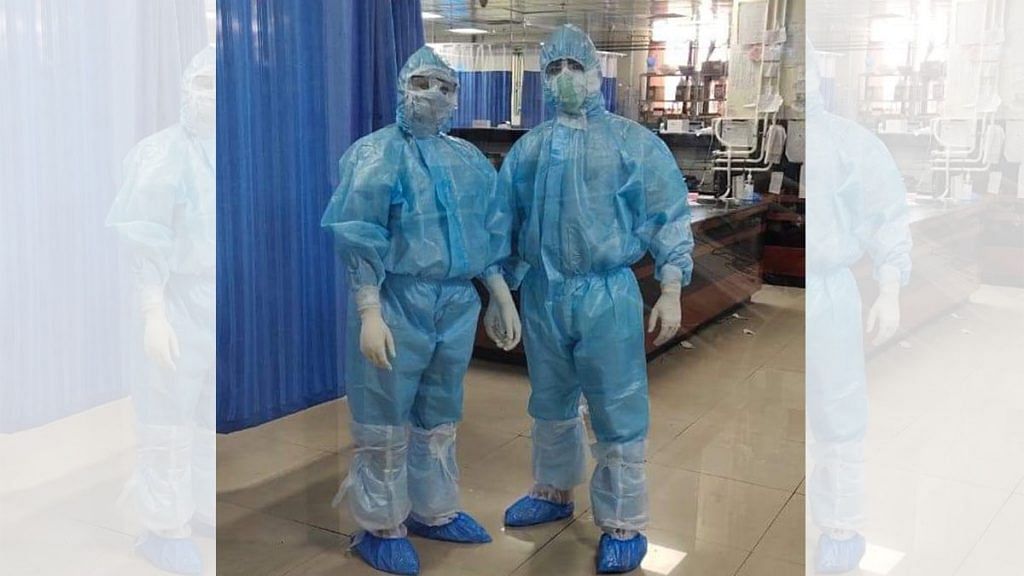New Delhi: For healthcare workers on the frontlines in the battle against the raging Covid-19 pandemic, Personal Protective Equipment (PPE) is the first and most crucial line of defence against the novel coronavirus.
The PPEs are vital to prevent transmission, as they create an uncontaminated interior considerably limiting the risk of infection. They are so indispensable, that there has been a scramble to procure the kits amid complaints from doctors and nurses of a PPE shortage.
But the protection comes at a cost.
Healthcare workers say long hours in the PPE suits gives them rashes, makes breathing difficult and in this country, leaves them at the mercy of the stifling summer. Eating, drinking or even urinating is out of the question during duty hours that can last from 6 to 8 hours and may even stretch to 12 hours in states like Maharashtra which has a significant number of cases.
“PPEs make us feel very hot and because of the heat, sweat keeps dripping down the face, which you can’t wipe away. At least private hospitals have AC wards. In government hospitals, we have fans only and you can even feel its air,” said Dr. Sanjibani Panigrahi, a doctor at the New Civil Hospital Gujarat, whose neighbour had harassed her because she was on Covid-19 duty.
Dr. Manish, the president of Resident Doctors Association at New Delhi’s Safdarjung Hospital, said that since cases are increasing exponentially, they have to wear PPEs even in non-Covid wards.
“Health care workers have to wear it for more than eight hours. The centralised AC is not used due to the fear of the spread of the virus,” he said, adding that most of the time, doctors have to wear diapers as they can’t even go to the washroom.
“Over the last few days, we have been going through terrible physical and mental breakdown, especially after wearing PPEs while on Covid duty,” said Deepak Munde who is a junior resident doctor at Mumbai’s King Edward Memorial (KEM) Hospital, adding that the rising heat leaves behind “sweat-soaked health workers”.
The PPE kit
The PPE kits have to be carefully worn to ensure that the body is completely covered.
Depending on one’s deftness, it takes around 10-15 minutes to don the PPE and 15-30 minutes to take it off while observing all infection control practices. Once inside, even using a stethoscope to examine patients is a challenging exercise.
“Communication is difficult as other people cannot even see your lip movements. The vision through the goggles or face shield is less than perfect but practice makes one adjust to it,” Meenakshi Bhardwaj, Medical Superintendent of RML, Delhi told ThePrint.
She added that even after donning the PPE, there is anxiety when one enters an infected zone. She further said one has to be really careful to ensure the PPE does not get torn or breached.
Her sentiment is echoed by Reena Masih, a nurse at PGIMS, Rohtak. “I was inside the Covid ward once for three hours, I was not anxious but the fear of getting infected was there,” she said.
Even getting out of the PPE is a task that requires careful handling.
According to Dr. Rashid Gouri, a senior resident at AIIMS, it takes almost 30-40 minutes to remove it cautiously with minimal aerosol generation. “We have to wrap and dispose of it in certain biohazard bags and bins separately to differentiate the components of it. We have to wash our hand at least 10 times after each step of removing it,” he said.
Gouri was to get married in April but the pandemic has postponed his plans. He said that once PPEs are removed, healthcare workers have to grapple with surgical gowns that are fully soaked “like wet towels”.
“We have to take a bath even at odd hours and are left with swollen and painful marks over our faces,” he said.
Also read: India’s testing strategy is right, we have increased the numbers significantly: AIIMS chief
